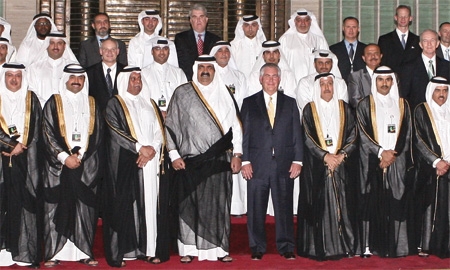Tapping into Qatar’s immense natural gas reserves by leveraging partnerships with leading multinationals has enabled Qatar Petroleum (QP) to establish a world-class liquefied natural gas (LNG) industry.
In recent years, Qatar has witnessed a series of historic milestones with its Qatargas and RasGas LNG joint ventures. Twelve out of the 14 projects are between QP and ExxonMobil. These megaprojects came on stream and helped make Qatar the world’s leading exporter of LNG. The largest gas liquefaction trains in the world, each having a production capacity of 7.8 million tons per year, are supplying LNG carriers that are now shipping Qatari gas to regasification terminals that the two companies have constructed in Europe and the United States, and to other customers throughout the world. In addition, last May QP and ExxonMobil inaugurated Al Khaleej Gas 2, an integrated gas project with a target production capacity of 2 billion standard cubic feet of gas per day, making it the largest domestic gas supplier in the State of Qatar.
The latest megaproject to hit the headlines in the Persian Gulf emirate is the multibillion-dollar joint venture between QP and ExxonMobil for the Barzan gas project. Deputy Prime Minister Abdullah bin Hamad Al-Attiyah says that the project “will play a critical and strategic role in sustaining the high growth rate of the Qatari economy.”
The Barzan project is expected to commence operations in 2014 and will produce 1.4 billion cubic feet of gas per day. Located in Ras Laffan Industrial City, Barzan will be operated by RasGas to produce and process gas from Qatar’s North Field. It will supply gas to power stations and industries in Qatar, ethane to the local petrochemicals industry, and associated liquid hydrocarbons for local and international markets.
Rex Tillerson, chairman and chief executive office of ExxonMobil, says Qatar is a model for other resource-rich nations with its “stable and sensible” policies that have facilitated resource development.
“There are two essentials that are necessary for a company like ExxonMobil to consider entering business in a new country and Qatar provided both of those,” says Mr. Tillerson. “First is the world-class resource in the form of the North Field, but equally if not more important is the leadership of the country and the vision of His Highness the Emir to create a business environment that gave us the confidence to risk our capital and bring our technology to the country. We knew that the contracts that we put in place with Qatar would be respected and we would have the opportunity, if we took the risk, to share in the rewards of those investments,” he says.
This long and stable partnership enables QP to make a significant contribution to continued economic growth and to human, social and environmental development. The investments contribute to Qatar’s National Vision 2030 for a sustainable development.
ExxonMobil is also a partner of the Qatar Foundation in special programs such as the Social Development Center’s First Step Program and Career Counseling Unit, which provide skills to young Qataris, especially young Qatari women, as they enter the workforce. The company is one of the main supporters of Qatar’s World Innovation Summit on Education.

0 COMMENTS